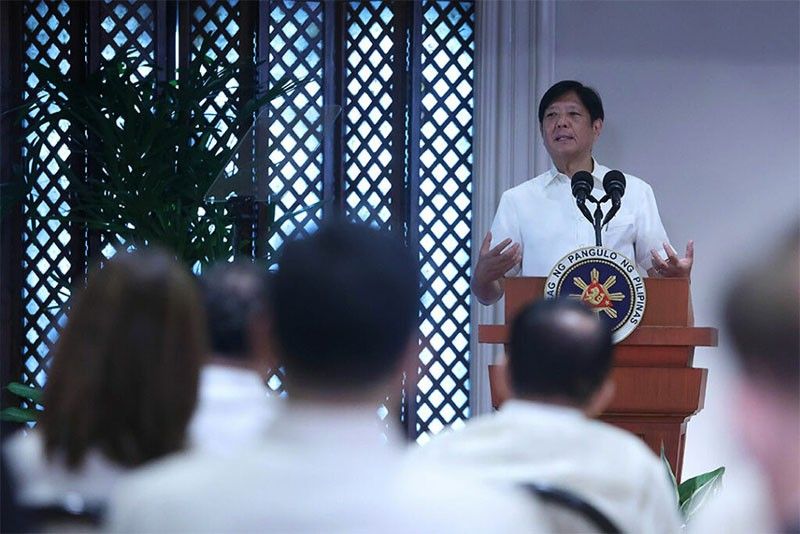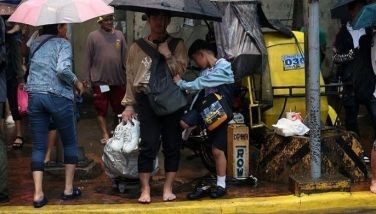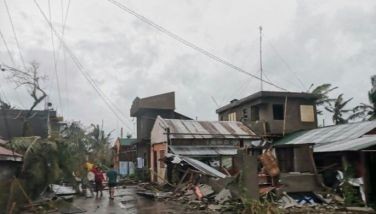Marcos: Philippines-US ties won’t change under Trump

MANILA, Philippines — President Marcos is optimistic of the unshakeable alliance between the Philippines and the US under the administration of president-elect Donald Trump.
“I don’t think it will change,” Marcos told reporters in an interview after gracing a welcome dinner Monday for the delegates of the Seatrade Cruise Asia at Okada Manila in Parañaque, when asked about the prospects for Philippines-US ties.
He said a change in US administration does not necessarily mean a shift in alliances.
“I will have to see if there is a major change, but I don’t think so. I don’t think so,” he added.
Marcos earlier congratulated the US president-elect, saying he looked forward to working with Trump “on a wide range of issues that would yield mutual benefits for the two nations with deep ties, shared beliefs, a common vision, and a long history of working together.”
“I am hopeful that this unshakeable alliance, tested in war and peace, will be a force for good, blazing a path of prosperity and amity in the region and on both sides of the Pacific,” the President added.
Trump recaptured the White House after defeating Kamala Harris in the recent presidential election.
In an interview at Malacañang on Monday, Finance Secretary Ralph Recto said he hopes trade relations between Manila and Washington would continue to flourish.
“We hope we can improve that. We are a national security ally of the United States. I’m sure they’re well aware that our economic security, if our economy does better, then we can be a more dependable ally,” Recto said.
Special Assistant to the President for Investment and Economic Affairs Frederick Go said on Monday the Luzon economic corridor would definitely push through under the Trump administration.
“That’s what the trilateral partners are telling us. This is a trilateral G7, which includes now the US and Japan, and there are other countries who want to join the corridor project,” Go said.
“So, we’re now in discussion on how to make the corridor more inclusive to the other countries that are interested in participating,” he said.
The Luzon corridor initiative aims to connect Subic Bay, Clark, Manila and Batangas, through high-impact infrastructure projects such as ports, rail, clean energy, semiconductors, supply chains, as well as other forms of connectivity in the Philippines.
The development of the Luzon economic corridor is an initiative being undertaken with the support of the US and Japan. It is an outcome of the Trilateral Leaders’ Summit of the three countries held last April.
It is also part of the Group of Seven or G7’s Partnership for Global Infrastructure and Investment initiative to promote investments in sustainable, inclusive, resilient and quality infrastructure.
Less optimism
Some senators, however, were less optimistic about a Trump administration, as they urged the government to prepare for the possible mass deportation of undocumented Filipinos from the US.
“Instead of sounding alarmist, our government officials should focus on creating a comprehensive contingency plan to assist our Filipino kababayans if, and when, president-elect Donald Trump follows through on his campaign promise to implement a large-scale immigration crackdown,” Senate President Pro-Tempore Jinggoy Estrada said.
“Easier said than done. It’s easy to voice hope that our undocumented kababayans already in the US would just decide to go home instead of waiting to be deported,” Estrada added.
“In addition to the efforts of concerned government agencies to create logistical support plans for eventual repatriation, authorities should also help returning Filipinos by providing them with jobs or other means of livelihood,” he pointed out.
“The families who depend on the remittances of our compatriots who do not have a legal basis to live in the US would also be affected in case they are forced to return home,” the senator said.
Sen. Joel Villanueva said the Department of Migrant Workers and the Department of Foreign Affairs have to be prepared for the repatriation and reintegration of Filipinos who may be deported from the US.
Villanueva said that part of the DMW Act is the provision of assistance to migrant workers, whether documented or not, in addition to a reintegration program for repatriated Filipinos from other countries.
The senator called for government agencies to be proactive in such situations and not just reactive.
“It is important that we are prepared for these situations and that’s the reason why when we pass the DMW Act, we have components in our law in the establishment of our DMW where we can help our OFWs, our migrant workers. Whether you are documented or not, we have a program,” he explained.
“We already know that there are possibilities that could happen, especially this change of leadership. The important thing is that we are ready and above all, we are ready to meet the needs and protect our countrymen,” Villanueva added. — Cecille Suerte Felipe
- Latest
- Trending



























